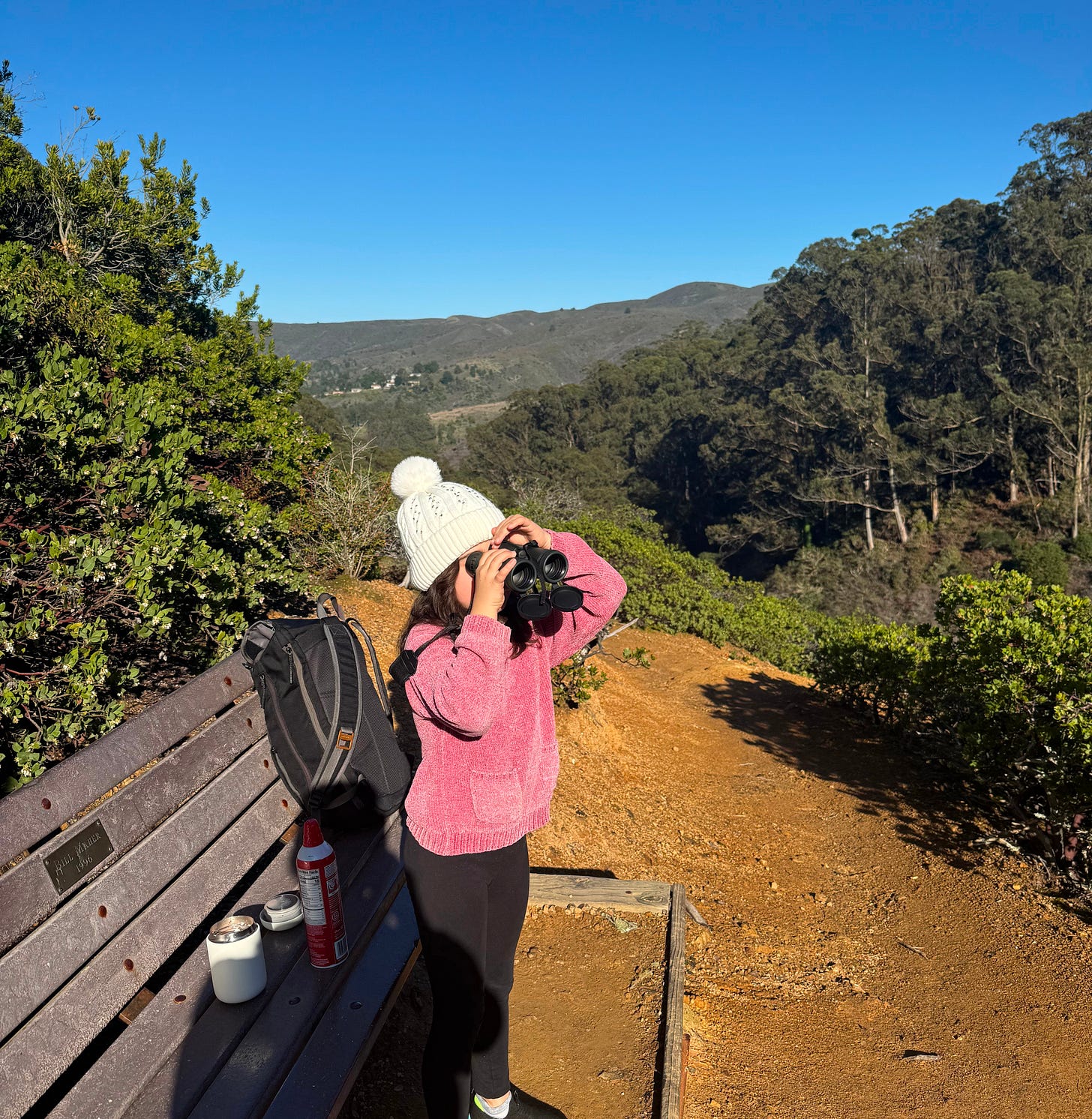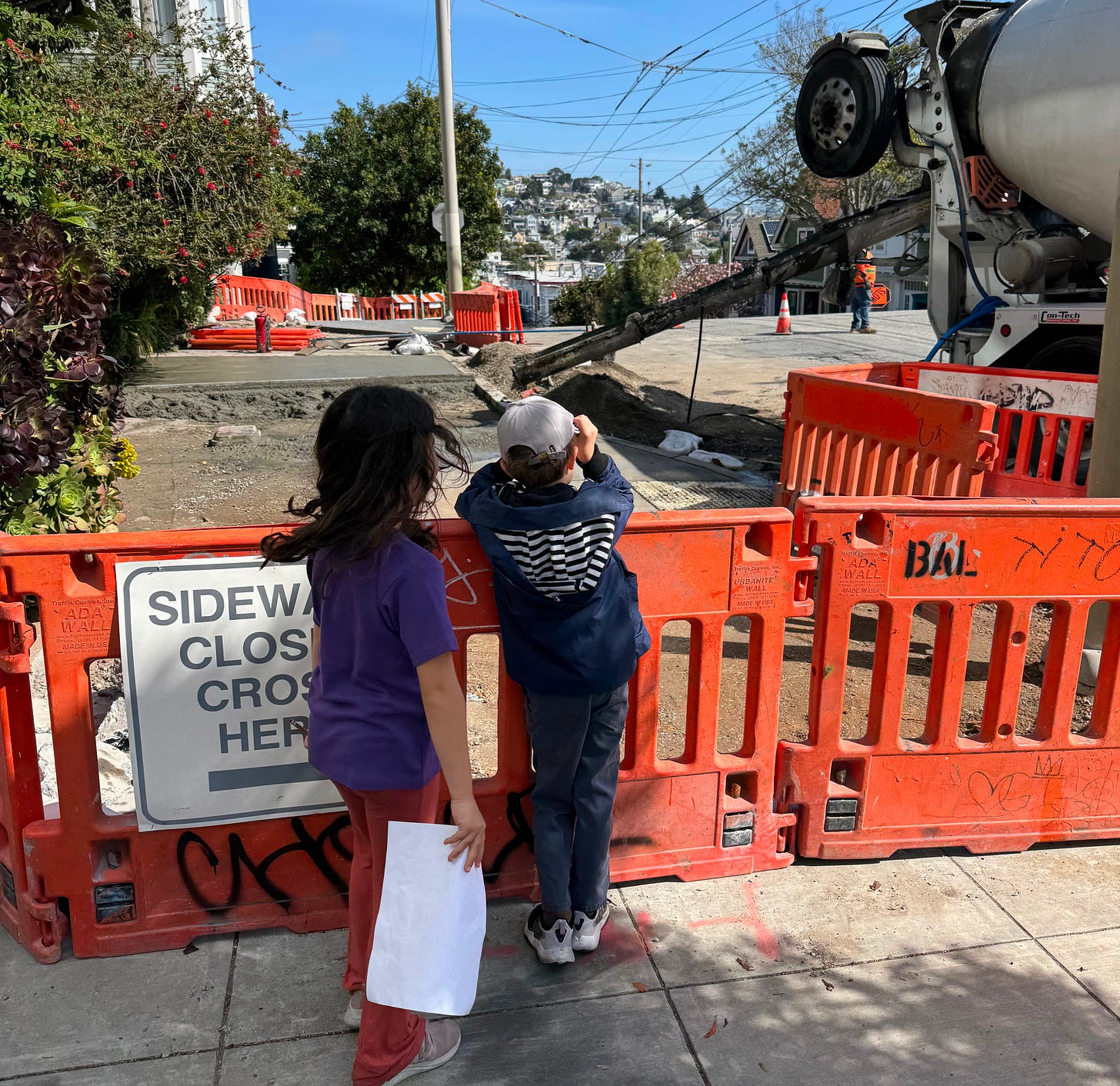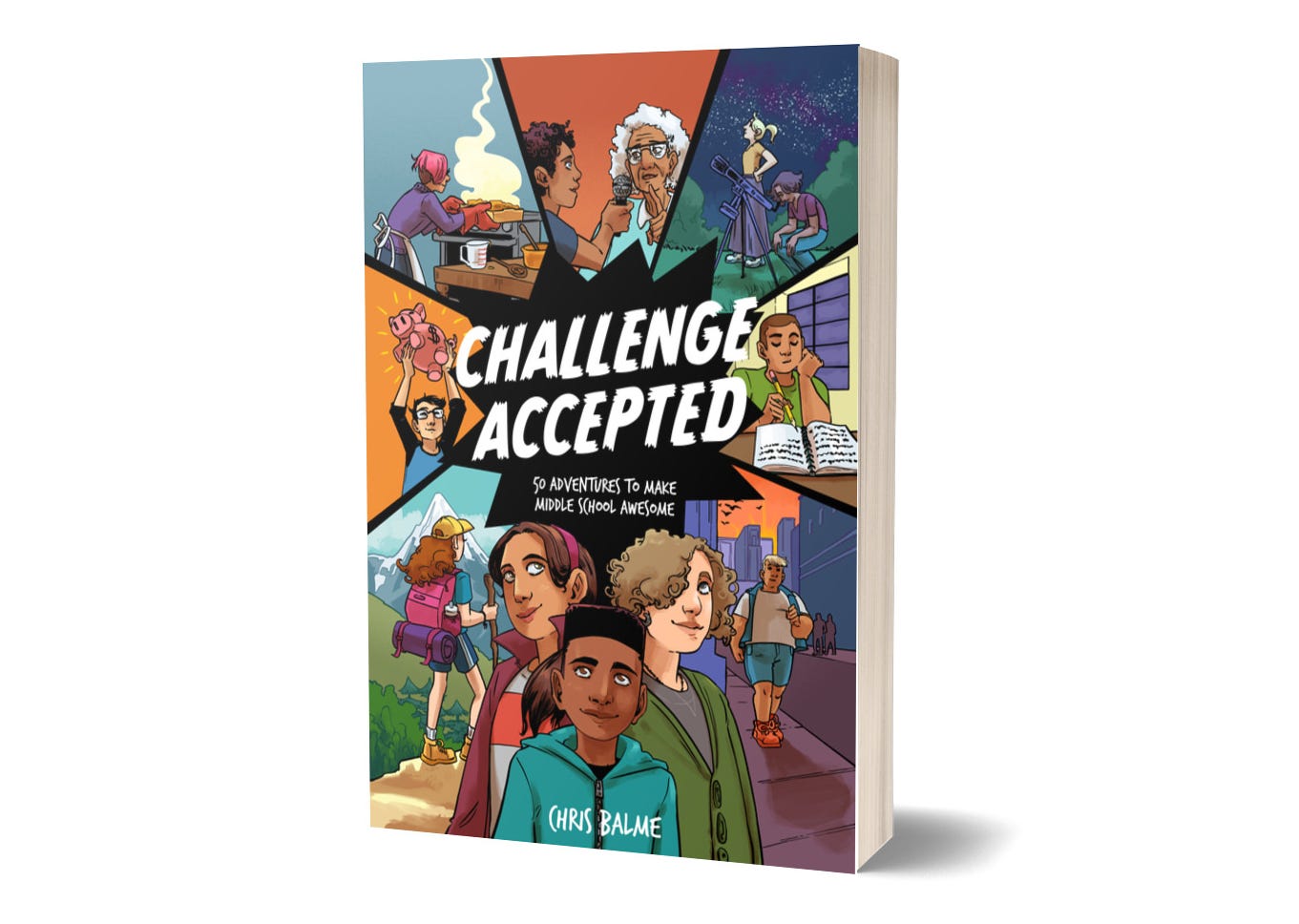A few weeks ago, on a perfect spring morning in San Francisco, I was strolling somewhat aimlessly, somewhat purposefully, behind two quite headstrong seven year olds. They were mesmerized for a time by a concrete pour taking place, watching as one worker carefully leveled the new surface until it met the sidewalk seamlessly. Later they took note of the architecture, debating what it meant to be a “modern” house, before agreeing that it was another way of saying “boxy.” They noticed plants, paused for insects, and talked almost constantly.
In their hands were two checklists, a set of challenges to notice things around them. Nope, not my curriculum — it was entirely designed and written by one of the seven year olds. Here is what she typed out, at painstakingly slow speed:
That’s all, and that’s all they needed. We wandered for maybe an hour, maybe 90 minutes, up and down the remarkably steep San Francisco hills. They were having a ton of fun. Near the end we stopped for cookies at a café and savored the last leg of the walk home, items checked off, just noticing random things around us and talking about them. A feeling of deep contentment came over me as I straggled behind them. One of those seven year olds was my daughter. And we were doing what she had asked for, repeatedly and pointedly: we had gotten her out of school to learn in the world.
To explain, I need to rewind a little bit. I’ve been beyond lucky to have helped start two schools. One was a vision I co-created from the start, and spent 7 years round-the-clock building — Millennium School. The second was an initiative I joined as founding principal, in support of its founder’s beautiful vision — Hakuba International School in Japan. Both initiatives transformed and expanded me, and both have had their shares of stress. That stress led me to feel quite clearly that I would not be embarking on more school-starting adventures anytime soon, at least not while I have young kids.
But oh does the universe love a good joke…
“No more starting schools,” I said. “More time with my kids,” I said. So what does it do? It has my own kids request a better school.
How am I supposed to say no to that?!
The details I’ve written about elsewhere, but the essence was this: my seven year old was bored to tears in our local school. She claimed that in two years she had not learned anything new. A bit bombastic, yes, but she also had a truth that felt important: she suspected that this was not a good place for her to learn, and she would rather not be there. She must have known that her pitch would resonate with me. I treasure her and learning too much to say “just get through it” — plus I have the good fortune of a flexible schedule, combined dangerously with a profound ignorance of how hard things are to do in real life.
So off we went.
My daughter’s name is Wren, so we called these days “Wrenesdays,” naturally. One day per week we go off into the world, pursuing an adventure that she’s chosen, sometimes from a menu of options I offer. Here’s a little sample:
A day baking bread and learning about what yeast do — how crazy is it that the farts of millions of tiny creatures are the key to one of our favorite foods?
A day about money — how it works, what a bank does, why it exists — concluding by marching into a bank account with her piggy bank to open her first account.
A day on the strange history and laborious process of making of chocolate, including going to a local chocolate maker and being mesmerized by the conching machine while eating too much chocolate.
A day about water, inspired by hearing that somewhere in the hills behind our neighborhood, a waterfall could be found after heavy rain. We went in search of it after a particularly wet week and voilà — to our amazement! — a 150+ foot waterfall. We got to talk about the water cycle while watching it.

Well, you can guess what happened with all these Wrenesdays. We had way. too. much. fun. She looked forward to these days all week. And I did just as much. Without exaggeration, they have been some of the best days of my whole life. Wandering, learning, fueled by curiosity and a modest purpose, with room to be surprised.
It’s gone so well that next school year, it looks like we’re taking the leap — from one to five days per week. And since I *do* still need to earn a living, and I want her learning to be social, we’re trying to coordinate a “pod” of other kids her age to learn together, in projects. It’s starting to sound awfully similar to…a school.
And yet, it isn’t.
I think it’s something a little different. And maybe, this difference points to something fundamental about how schools function (or could function better).
Schools are a compression of community. They try to squeeze the key knowledge and skills of an entire community into one building, while simultaneously taking care of kids so parents can work. Yet when I look across the best “Wrenesday” projects we’ve done, the common theme is that we got into community, in contact with people and places around us. In other words, we’ve been “de-compressing” community.
One of the best parts of this, simply put, is that communities have options. They offer choice, and as a young person (or anyone) makes a choice, they activate their motivation. We don’t need to rely on coercion, like using assessment as a stick or carrot as most schools do (more on what that does to us here).
Second, to state something both obvious but also not put to use nearly enough: communities have resources.
We are accustomed to a mindset that is highly resource-constrained, as both parents and educators. As a working parent, I often feel pushed to my max in order to earn enough money and support my kids as I wish. And working in schools, I see educators stretching every last penny and minute to meet education goals. So it’s not surprising that if a child is suffering in school, often there is no “give” around them, nothing that feels changeable. The parent(s) can’t stop working, the educators have no time to slow down.
Well, there is one place that is not over-stretched. To state the obvious again: communities are places of abundant learning. Was anyone logging the concrete pour as a learning opportunity? Or the waterfall? How curiously empty of kids most of the world is on a typical weekday. We saw no one on the path to the waterfall. The concrete pour was only being watched by the birds. All of these community learning moments go unwitnessed, while in the place called school, adults are stressing and straining to provide enough engaging learning.
So maybe what I’m hoping to create is not a school. Maybe it’s not even really a “pod.” Perhaps, idealistically, it’s a tiny example of a healthy community. Kids with natural curiosity, gaining access to a community where things are happening (like waterfalls and banks and chocolate makers), with some adult facilitation to help them get there and to understand what’s going on under the surface.
So here we go into full-time “community learning” or whatever we call it next year. I’ll report back on how it goes. I have a feeling it will change how I see education in general and how to help schools. Because in all our bustle and urgency, maybe we’ve been missing some obvious resources, while coercing kids into an odd version of community. What if we gave kids a radical level of dignity? Believing that they will be OK, that coercion is not required for them to succeed, and that their curiosity and spirit of play are worth following.
In Other News…
Book Update: It’s almost here! My second book, Challenge Accepted, is out of my hands now and off to the layout designer, on track for our planned August release. Meanwhile I’ve been thrilled to receive some wonderful support for it, most recently from the amazing researcher and bestselling author Peter Gray, who wrote “Buy this book for every middle schooler, or about-to-be middle schooler you know. It just might provide the spark that turns what can be difficult years into years of awesome adventure and growth.” Holy smokes!
Advisory Facilitation Training. For the past six summers minus one for covid, I’ve had the great pleasure to co-lead a facilitation training in San Francisco for teachers from around the world. It’s about one of the most radical shifts I can imagine in education: from acting largely as instructors (focused on content), to facilitators (focused on conditions). And it focuses on advisory, exploring how we make it a place of honest conversation, deep social-emotional learning, and a lasting sense of belonging. This summer’s cohort sold out quickly, so we decided to add a second group, which has a few spots remaining — details here.







Sounds like a Flying Squad! https://www.flyingsquads.org/
I love what you are doing! I wish I had known about this kind of stuff 25 years ago when my kid was bored to tears with school. I didn't know what to do. I tried making him go to school. I tried tutors. I tried home schooling. Finally we stumbled on unschooling by accident. He go to do what he wanted, which was mostly play video games and read, but he read Shakespeare and taught himself Finnish for fun. He walked and trained his dog, and healed from the nasty divorce. If only there had been some support for me those years. I now want to support others, and try to spread the word about what school could be to anyone who will listen.